A House Owned by a Psy-trance Hippy, an Ex-crack House, and Other Places I’ve Lived
by William J. Read
Where have you lived William J. Read?
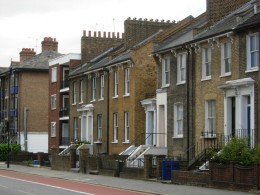
Hackney, London, GBP £340/month, 2008
A deceptively gentle introduction to the world of privately rented accommodation found me in the spare room of a heart-meltingly welcoming mother and daughter hippy double act. I was periodically left to my own devices as they toured the psy-trance festivals of Europe, and on one such occasion received a visit from a dapper Indian gentleman dressed in flowing purple robes who referred to himself only as “The Magic Genie.” I ruined the vibe somewhat by giving in to the temptations of corporate avarice and doing an internship at Citigroup. However, I didn’t care, because I earned more money than I ever have since in exchange for pretending to look at Microsoft Excel for 8 hours a day.
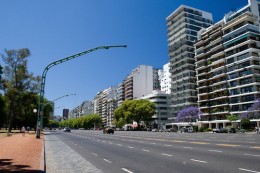
Palermo, Buenos Aires, USD $400/month, 2009
After leaving university I made a concerted attempt to flee the cold, boxy embrace of the neverending spreadsheet, and ran away to Argentina to find fame and fortune in the New World.
My first fixed abode was an apartment opposite the heavily guarded U.S. Embassy, in the kind of neighborhood where perfumed ladies of a certain age walk the streets with miniature dogs. My flatmates were a pair of Italian lotharios who ruthlessly exploited the fact that every cute girl in Buenos Aires has a lovely old Italian grandmother, and has a corresponding affinity for the Old Country.
I watched, awestruck, as they returned home on a seemingly nightly basis with a rotating selection of dusky beauties. I realized that my own brand of inept chat up lines was more of the Borat school of foreign charm than that of Casanova, and decided to learn Spanish.
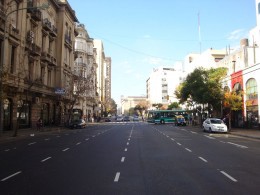
Monserrat, Buenos Aires, USD $110/month, 2010–2011
An aversion to work drove me to find cheaper living arrangements, which in Buenos Aires means heading south, to the dark and scruffily romantic neighborhoods that gave birth to tango. I ended up in a tiny room in a flat shared with an array of Colombians, Venezuelans, Ecuadorians, and even a token Argentinian. None of them spoke English, which I assumed would lead me to magically acquire Spanish by association. Not so — for four months, I regressed to a state of mute idiocy. I sat for hours in front of the television, bewildered, as everyone around me erupted into paroxysms of laughter at rapid-fire jokes about obscure Argentine celebrities. I gave up on dinners and went to bed hungry because I didn’t know the word for saucepan. I couldn’t roll my Rs.
Despite the language barrier, we managed to coexist in harmony. They loved clubbing, and I followed them to clubs like a silently enthusiastic labrador. They fed me various things and patted me on the head. I realized they had fed me acid and panicked slightly before realising that it was fine because LAZERS. Clubs were the perfect environment for me as it was too loud to have a conversation over the techno. My flatmates loved techno. In fact, they fucking loved techno. And not only did they fucking love techno on Saturday nights, they seemed to love it even fucking more on Tuesday nights at 4 a.m. This wasn’t ideal, given that my day job involved entertaining 60-year-old businessmen in one-on-one sessions of anything up to two hours. Unfortunately I wasn’t working as a high class male escort but as a low class male English teacher, which meant the wages weren’t great and turning up tipsy wasn’t really an option.
Eventually, thanks to neverending repeats of the Simpsons, and 24/7 rolling coverage of football (soccer), I learned how to communicate. By this time it was summer and all the 60-year-old businessmen had left for the beach with their high class male escorts, so my money ran out completely.
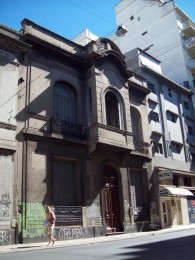
Constitucion, Buenos Aires, free, 2011
Thanks to my newfound ability to speak both English and Spanish, sometimes even in the same sentence, I landed a job in a hostel which offered free rooms to workers in a place nearby known as “the crack house.” It was in Constitucion, where until that point people had warned me not to go.
Having assumed they were joking about the whole crack house thing, I turned up on the doorstep with my meager possessions only to discover that it did very much resemble a crack house. To be more accurate, it was an abandoned hotel which had been a crack house in the past, but was now an ex-crack house. Most of it was still derelict but some of the rooms were habitable — one of which I inhabited.
There were positives and negatives to this arrangement. Besides the absence of rent, the positives were the huge multi-leveled roof terrace, and the red lampshade in my room which made it feel like a cheap whore’s boudoir (come to think of it, it probably had been a cheap whore’s boudoir before I moved in). The negatives were the cockroach infestation in the kitchen, and the fact that the metal window shutters in my room were wedged shut. In the oppressive midsummer heat of a muggy subtropical city this was not ideal.
After a few months in the crack house I realized that all of my material possessions were broken, and that the southerly trajectory of my living arrangements in Buenos Aires needed to be addressed. I also noticed that my 90-day tourist visa had run out over a year previously, and decided to head home to sort my life out.
High Barnet, London, free, 2011
Step one of sorting my life out involved moving back into my mother’s house, on literally the last street in north London before everything becomes fields. Although High Barnet does have a tube station, you’d be better off living in a place that doesn’t try to pretend it is actually part of London, and instead accepts the fact that it is a different place entirely and has a reasonably fast train service connecting it to the city. Potters Bar, for example, lies a few miles further out, on the other side of the M25 ring road which acts as a kind of traffic ridden, perma-jammed city wall. From Potters Bar you can be at Kings Cross in 19 minutes. From High Barnet it takes 41, and the privilege of using the slower and more cramped tube train doesn’t come cheap. A monthly travelcard permitting you to travel the biblical distance into central London on a daily basis sets you back £219.70.
During this period I worked night shifts at a youth hostel-cum-24-hour bar as a kind of stepping stone to the real world of gainful employment. The bar played host to an interesting mixture of colorfully tongued Lambeth locals, and curious yet apprehensive foreign guests who normally hung out together as if united in Otherness.
One balmy summer evening a couple from Texas checked in and settled in at the bar next to a friendly Australian chap who seemed intent on reinforcing every stereotype you have ever heard about Australians. His uncouth brand of antipodean charm did not go unappreciated, and with the aid of overpriced Jagermeister, the three became friends. In fact, the Australian and the female half of the Texan couple became particularly good friends, while her male counterpart gently fell asleep on the bar. An hour or so later he awoke and tottered off to bed in search of love’s warm embrace, only to return a few minutes later with a swollen fist and a face like thunder. Upon entering the dormitory he’d discovered two suspiciously empty berths, and upon further investigation he’d discovered his girlfriend suspiciously naked in the shower with his erstwhile drinking companion from down-under. Showing admirable restraint given the circumstances, he beat a swift and furious tattoo upon the bathroom wall (hence the swollen fist) and returned to the bar to drown his sorrows.
His misfortune was my delight as I acted out a life’s ambition I never knew I had. Playing the role of film-noir bartender, I somberly wiped down a bar that didn’t really need to be wiped down, as a forlorn soul poured his heart out to me, pausing only to order whisky. He even had an American accent. It was perfect.
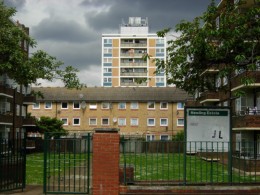
Hackney, London, GBP£340/month, 2012
Having secured a Proper Job, the final step to becoming a Real Person was to get my name on some kind of lease, legally binding myself to a property and thus becoming more eligible for credit, enabling me to consume beyond my means like any other respectable member of society.
In London’s cripplingly oversubscribed private rental market, finding a cheap room tends to involve a whirlwind dash around a series of undesirable properties in undesirable locations, each of which hosts an X-Factor style auditioning process in which you and 30 other disorientated-yet-probably-likeable people compete for the affections and acceptance of the current housemates.
I eventually came second in an audition, which was enough to secure a box room replete with badly painted purple walls and a horribly stained bed. The house did however boast a living room and garden and was a 10-minute walk from my newfound workplace, so I signed the lease, spent a week painting walls and fumigating furniture, and finally moved in. Only to be sacked from work the next day. My new job was over an hour away on the train. So it goes.
I have since remained at the house for over two years, gradually replacing the original housemates with friends, or strangers from the internet. Negatives about the place include a tight-fisted landlord and shockingly incompetent estate agents. Positives include the fact that neither the landlord nor the estate agents know or care what goes on the house, which means we have free reign to burn their disgusting furniture in the garden as we see fit. The house is also blessed with The Best Neighbors Ever™, a retired West Indian couple with whom we collaborate to grow tomatoes and alternative medicinal herbs in the garden.
William is a young, downwardly mobile semi-professional born and living and London, but technically from the North of England.
Photos via Wikimedia Commons
Support The Billfold
The Billfold continues to exist thanks to support from our readers. Help us continue to do our work by making a monthly pledge on Patreon or a one-time-only contribution through PayPal.
Comments